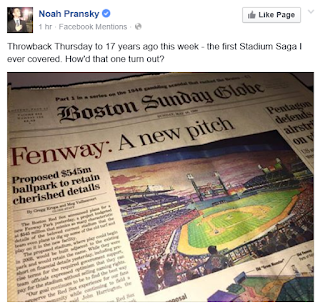A couple weeks ago, Rays owner Stu Sternberg issued a "non-threat threat"
that basically said
the Rays may be outta here if local corporations don't start buying up tickets. He suggested that only when corporations meet the challenge, can the Rays move forward with finding a new stadium solution. This makes total sense from a business standpoint.
It was a similar tone Sternberg struck back in 2005, when
he purchased majority ownership of the franchise and put unknown "Harvard Business School graduate Brian Auld" in charge of duct-taping together the Trop:
"If we can't make it work at Tropicana Field, I don't believe - and I could be proven wrong - but I don't believe it automatically works because of some panacea of some other ballpark."
But the preceding paragraph in that same 2005 article seems at-odds with everything Sternberg has done in the 11 years since. He makes this promise to Devil Rays fans:
"You will never - and I will say it now and hopefully I can say it and you'll follow up - you will not hear the words, "We need to have a new stadium,' " Sternberg told a group of Times editors. "We might like to have a new stadium. We can work with the authorities to have a new stadium and work with businesses to have a new stadium, but it won't be from a sense of "need.'
Stu, I'm following up, as you requested. I should have done this in 2010, when you told the region you "
need to be in a location that's convenient (and) attractive" and "
the discussion needs to begin soon" if the team is going to stay in Tampa Bay long-term.
To your credit, you didn't stand behind that 5.5-year-old non-threat threat any more than you stood behind your 2014 non-threat threats that the franchise was "
doomed to leave" without a new ballpark soon, or that
you'd walk away from the negotiation table after St. Pete's council voted down one of your proposals.
Yet, your flip-flop is pretty evident, even if the "need" for a new stadium isn't the team's
only "need."
READ HERE - 2011 post - "Is new Rays stadium a 'need' or 'want?'"
So what prompted the broken promise? It would seem, Stu miscalculated his investment.
"We have learned (attendance) is not just about winning,"
Sternberg admitted in 2010, five years after assuming control of the Rays.
But the miscalculation should not be Tampa Bay's cross to bear.
If SeaWorld built a new orca tank the week before Blackfish came out...then claimed a business miscalculation in smaller-than-expected profits...how do you think taxpayers would feel about requests to build them a new state-of-the-art orca tank?
Or if Pitbull had a reputation-damaging scandal that threatened his "Mr. 305" brand...how would taxpayers feel about a request to subsidize his next tour so that he could continue to rain economic impact on Florida?
Similarly, the Rays/MLB miscalculations - and changing business models - aren't the fans' fault.
Furthermore, isn't the "we aren't making enough profit" line a tough sell around here, in a time where Pinellas County is struggling to get its schools in-order and Hillsborough County can't properly fund transportation? All the while, as MLB closes in on $10 billion a year in revenue?
Sternberg
did say when he bought the team the ballpark may need replacing before 2027...but he was not officially asking for public help; just a "partnership" with local governmental and business interests:
"I would expect it to be cooperative, and I think cooperative always works best. Now is it 90-10, or 10-90, or 50-50? You have to look at it and get a sense of where the benefit is coming and where it's going," he said. "We are not going to build a stadium at whatever point in time that comes to line our pockets. If it's necessary to do, and it will be necessary to do at some period of time, it will be done because it works for the community, it works for the area, it makes a lot of business sense and it makes a lot of sense for something that will create a lasting showpiece. "Even if we pay for the whole thing, it will be cooperative. But I don't anticipate us having the ability to ever pay for an entire stadium."
But just as Sternberg didn't forecast attendance struggles like the Rays have experienced, he probably also didn't forecast the MLB revenue boom, largely on the back of its digital properties. So yes, MLB & the Rays
do have the ability to pay for their own stadium. They just won't.
And they won't officially ask for public money, either. Because asking for public cash is so 1990s. Nowadays, it's much more en vogue to rely on the non-threat threat of possible relocation!
FOLLOW: Shadow of the Stadium on Twitter
FOLLOW: Shadow of the Stadium on Facebook
